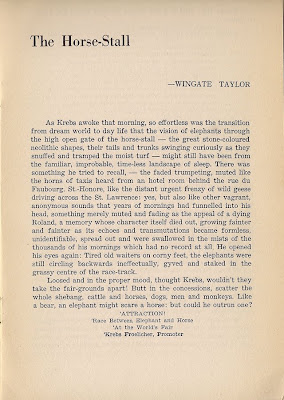Yes, G is for Glassco. After all, it's not been a week since the launch of The Heart Accepts It All: Selected Letters of John Glassco, edited by yours truly.
Most of Glassco's correspondents were writers – and all but one are writers whose work I've read. The exception is the prolific Geoffrey Wagner, a professor of literature at City University in New York City. The American academic was very important to Glassco's career, playing an advisory role in dealings with publishers of pornography. It was through Wagner's efforts that Glassco was finally able to place The Temple of Pederasty, a work Maurice Girodias had twice turned down.
Wagner's own bibliography is remarkably varied, encompassing titles like Wyndham Lewis: A Portrait of the Artist as the Enemy (Yale UP, 1957), Another America: In Search of Canyons (Allen & Unwin, 1972) and Five for Freedom: A Study of Feminism in Fiction (Fairleigh Dickinson UP, 1973), along with sadomasochistic porn penned under the pseudonym P.N. Dedeaux. His novel of "Prussian discipline", The Prefects (Taurus, 1970), uses lines from Glassco's Squire Hardman as an epigraph.
As I say, I haven't read anything by Geoffrey Wagner, but I think this might be the place to start:
The Heart Accepts It All includes four letters to Wagner, in which Glassco shares his thoughts on Penthouse Forum, Pierre Elliott Trudeau, high school hockey, The Englishwoman's Domestic Magazine, sadomasochism, riding crops and other things equestrian. They're worth reading in their entirety, but for reasons that will become clear I present this small excerpt from a letter to Wagner dated 3 December 1968:
Dear old Bizarre! It was an oasis back in the dreary fifties. Yes, I remember the wonderful photo of Mlle. Polaris, the Queen of the Wasp-waists, in her extraordinary corset, which John Willie unearthed and reprinted. I contributed a letter to his correspondence column. He was a Pioneer.This sent me on a lengthy hunt through the 1824 pages of The Complete Reprint of John Willie's Bizarre (Taschen, 1995). I'd hoped to come across something credited to Miles Underwood, S. Colson-Haig, Silas N. Gooch or any of Glassco's many other pseudonyms. When nothing turned up, I started reading the letters themselves, thinking that I might just recognize something in their style and content.
And so it was that in issue #22 I found this piece of correspondence under the heading "WHITE CIRCLE CLUB":
I am fascinated by your magazine because, even though I am in my thirties, this is the first time I have been able to avail myself of the sincere, uninhibited thoughts of others regarding leather and bondage. So, due to Bizarre, I know my hidden desires are not quite so isolated as I had feared.Now, Glassco didn't live in New England, but twenty kilometres to the north; he was also a few inches short of six-feet and would've been in his forties at the time. But then these sorts of letters are invariably replete with lies, exaggeration, camouflage and masquerade, aren't they?
An attractive girl, clad in snug, well-tailored jodhpurs or breeches which are well reinforced with suede or some other soft, resilient leather at the seat and the inner sides of the legs is certainly a lovely sight. And the thought that such a girl might entertain the desire to put me in bondage, or that she might enjoy giving me some discipline, is encouraging to say the least.
But it is frustrating, here in staid old New England, to find the company of such a person. To be sure, I attend horse shows and ride often at nearby stables, but with no success, despite many conversations with attractive girls.
So, why not suggest that those whose thoughts are similar to mine put a little circle of white paint on each of their riding boots, and at the rear, just where the heel is stitched to the soft leather? By so doing we could identify others with whom we have ideas in common.
But, at any rate, I enjoy using your magazine as a "clearing house" for thoughts from other readers, one of whom might be intrigued in having a six-foot, 170-pound bachelor for her prisoner.
J. FOSTER
In both style and substance, the words read like Glassco. Could J. Foster and J. Glassco of Foster, Quebec be one and the same? I can't say for certain. What I do know is that they shared proclivities, frustrations and, ultimately, loneliness.
Polaire
(nee Émilie Marie Bouchaud)
1874-1939
RIP


























































